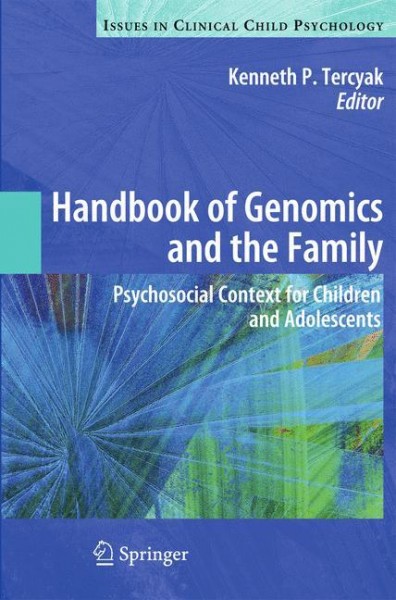
Handbook of Genomics and the Family
Kurzinformation
inkl. MwSt. Versandinformationen
Artikel zZt. nicht lieferbar
Artikel zZt. nicht lieferbar

Beschreibung
imperfectandwithlimiteddata(Ng,Murray,Levy,&Venter,2009). Theabovescenarioraisesmanyquestionsfortoday'shealth-carec- sumers. For example, for whom is this information applicable, and for whatpopulationsorsubpopulationsisitnot?Underwhatcircumstances might this information be useful, and when should it be disregarded as irrelevant?Andperhapsmostimportantly,what,ifanything,canbedone inlightofinformationaboutpersonalgeneticrisktoeffectivelylowerthe oddsofbecomingsickandraisetheoddsofstayinghealthy? vii viii PREFACE Becausetheprevalenceofmostdiseasesvariesasafunctionofage, gender, race/ethnicity, and other personal characteristics, answers to these questions are complex and many are just beginning to be und- stood(Khouryetal.,2009).Someexpertshaveconcludedthattheanswers tosuchquestionsremainoutofreachatthepresenttimeandmayc- tinue to be elusive for another 5-10 years (Frazer, Murray, Schork, & Topol,2009).Yet,twenty-?rstcenturyhealth-careconsumers,providers, and policy makers face these choices now about incorporating personal genetic information into health management and often do so without a complete and accurate understanding of the potential impact of their decisionsonmultiplelevels(Carlson,2009). von Tercyak, Kenneth P.
Produktdetails

So garantieren wir Dir zu jeder Zeit Premiumqualität.
Über den Autor
Kenneth P. Tercyak, PhD is an associate professor in the Division of Health Outcomes and Health Behaviors of the Department of Oncology and in Pediatrics at the Georgetown University Medical Center in Washington, DC. He received his bachelor of arts degree in psychology from the University of Pennsylvania, and doctor of philosophy in clinical psychology from the University of Florida's College of Public Health and Health Professions.Dr. Tercyak's research has focused on cancer prevention and control among children, adolescents, and families. This includes investigations of the social and behavioral aspects of genetic testing for hereditary cancer syndromes among parents, developing and testing strategies for informed decision making and communication support in cancer genetics, and evaluating long-term outcomes among children growing-up in environments affected by familial cancer. Dr. Tercyak's other investigations have included a focus on biopsychosocial influences on youth smoking adoption, pediatric cancer survivorship, adolescent health promotion, and predictive testing for common disease risk. He has received continuous funding by the National Institutes of Health since 1998, including a National Research Service Award and Research Career Development Award from the National Cancer Institute, and funding from the National Human Genome Research Institute's Ethical, Legal, and Social Implications research program and the Division of Cancer Control and Population Sciences at the National Cancer Institute.Dr. Tercyak's scholarly contributions consist of more than 75 journal articles and book chapters. He has delivered invited presentations at a number of scientific organizations, including the American Society of Human Genetics, the Dana-Farber Cancer Institute, and St. Jude Children's Research Hospital.Dr. Tercyak is a Full Member of the Division of Population Sciences and the Jess and Mildred Fisher Center for Familial Cancer Research at the Lombardi Comprehensive Cancer Center at Georgetown. He is also a member of the Behavioral Medicine Study Section of the National Institutes of Health, and former member of the psychosocial peer review committees of the American Cancer Society and Susan G. Komen for the Cure Foundation; he has served as a grant reviewer for other National Institutes of Health study sections and special emphasis panels and international research organizations as well. Dr. Tercyak is a reviewer for a number of professional journals. Currently, he is serving a term as Associate Editor for prevention science at the Journal of Pediatric Psychology and is a member of the incoming editorial board at Health Psychology.

- paperback
- 608 Seiten
- Erschienen 2016
- Bodley Head

- Kartoniert
- 224 Seiten
- Erschienen 2013
- Cornelsen Verlag

- hardcover
- 702 Seiten
- Erschienen 1987
- Cold Spring Harbor Laboratory

- paperback
- 732 Seiten
- Erschienen 1983
- John Wiley & Sons Inc

- hardcover
- 358 Seiten
- Erschienen 2003
- CRC Press

- hardcover
- 289 Seiten
- Erschienen 1997
- Springer

- Hardcover
- 287 Seiten
- -






































